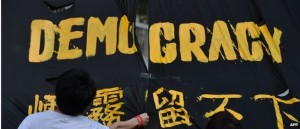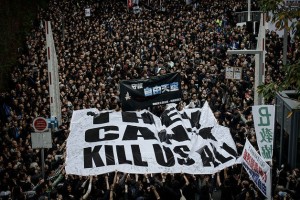
Wearing black T-shirts and yellow ribbons, the symbols of the democracy movements, they have been taking the streets in response to a decision by the senior Chinese leadership to set out clear limits on who can run for the position of chief executive, Hong Kong’s top leader, in 2017.
The Hong Kong tourism industry trade unions held a media conference expressing that due to the campaign, most merchants are not doing well during the Golden Week.
Tourism is one of the economic pillar industries in Hong Kong. There are more than 620 thousand employees doing jobs relate to retail, catering, hotel and other industries. However, due to the sustaining campaign in the main area of tourism consumption, National Tourism Administration of China has stopped examining the tourist to HK. At the same time, other countries are making warning to their citizens as well, which will inflict heavy loss in HK tourism industry.

Dingming Lei, professor from Hong Kong University of Science and Technology, estimated that this campaign has already cost more than 350 billion HKD. However, as this campaign is considered as a negative affair, more potential loss will occur in the future. It will certainly trigger the concern for both market and investors of whether the so-called International Finance Centre is still reliable and stable or not.
Work Cited
Liu, Juliana. “Did China go back on its promises?.” BBC News. N.p., 2 Oct. 2014. Web. 2 Oct. 2014. <http://www.bbc.com/news/world-asia-china-29454385>.
http://www.bbc.com/news/world-asia-china-29454385
Hong Kong democracy timeline
- 1997: UK gives Hong Kong back to China under a 1984 agreement giving it “a high degree of autonomy” for 50 years
- 2004: China says it must approve any changes to Hong Kong’s election laws
- June-July 2014: Pro-democracy activists hold an unofficial referendum on political reform. Both sides hold large rallies
- 31 August 2014: China says it will allow direct elections in 2017 but will pre-approve candidates
- 22 September 2014: Student groups launch a week-long boycott of classes
- 28 September 2014: Occupy Central and student protests join forces and take over central Hong Kong
- 2017: Direct elections for chief executive due to take place
- 2047: Expiry of current agreements
More to read:
